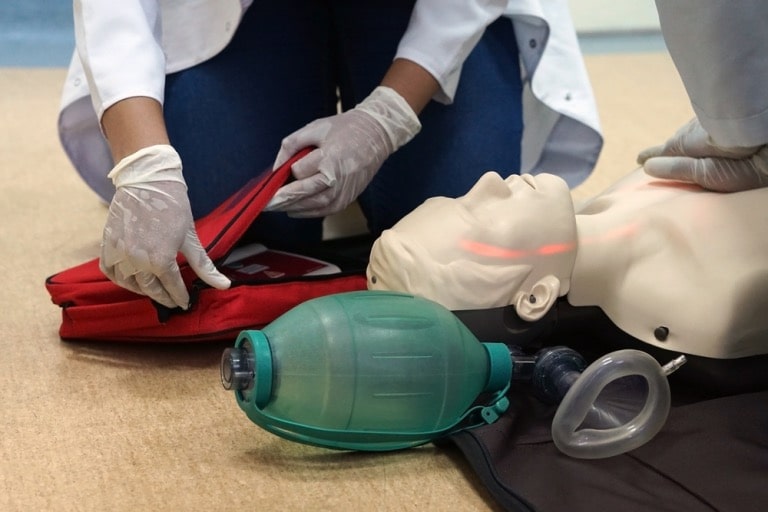In moments of emergency, your Basic Life Support (BLS) skills can save a life. For that, you will need to earn your BLS certification to ensure that you are an asset at such times of need. However, it’s important to remember that this certification has a defined validity period.
Understanding this timeframe helps you ensure that your skills remain updated and effective. This certification shows that you possess the ability to perform essential skills such as performing CPR, managing choking incidents, and using an AED in emergencies.
Typically, BLS certification is valid for two years. After this period, you need to renew it to ensure your skills are up-to-date. So, let’s explore how long does BLS certification last and how to stay updated by renewing it regularly.
How Long is BLS Certification Valid?
Generally, the validity period of BLS certification lasts for 2 years before the time comes to recertify. Not just BLS certification but other cardiovascular health-related certifications such as ACLS and PAL also have a validity of two years.
Courses from different institutions hold varying levels of importance, but their main aim is to provide essential methods for primary treatment in emergencies.
BLS training specifically covers basic measures such as:
- CPR (Cardiopulmonary Resuscitation)
- Choking relief
- Other fundamental skills
Understanding the validity period of BLS certification is important for healthcare professionals as it ensures that their skills remain effective. Regular recertification helps maintain a high standard of care and readiness in critical situations.
Recertification achieves this by ensuring that healthcare professionals are up-to-date with the latest medical guidelines and techniques. It refreshes essential skills such as CPR and choking relief, making sure they are performed correctly and effectively. It guarantees that healthcare providers can deliver the best possible care when it’s needed the most.
Why Does BLS Certification Expire?
BLS certification expires to keep skills and knowledge up-to-date with new medical standards. Recertification ensures that emergency care practices stay effective and accurate.
Need for Ongoing Education and Skill Refreshers
Healthcare professionals play a critical role by making quick, life-saving decisions in emergencies. Their skills and knowledge can greatly affect patient outcomes, so staying updated and practicing regularly is essential to providing the best care.
Ensuring Healthcare Providers Maintain Competency
BLS certification expires to ensure practitioners regularly update their skills and knowledge. This helps keep their practical abilities up-to-date and allows them to learn new techniques, ensuring they remain effective in emergencies.
How to Maintain BLS Certification
As the medical field evolves with new research and practices, healthcare professionals and others needing CPR, ACLS, and PALS knowledge must stay updated. They need to implement the latest information to remain current. Here are some processes that can help you maintain your BLS certification:
Understanding the Recertification Process
To recertify, you need to renew your BLS certificate every two years. To do this, choose and apply for a recertification method that suits your schedule and learning preferences. Knowing the expiration date of your current certificate helps you plan your renewal in advance.
Exploring Renewal Options
There are several options for certificate renewal, such as classroom training, online learning, and hybrid or blended learning. Choose the BLS training program for certification renewal based on your availability and the learning method that best suits your needs.
Staying Up-to-Date Between Certifications
Staying up-to-date between certifications is important because it ensures your skills and knowledge remain current. This will allow you to provide the best care in emergencies. Regular practice and learning help you adapt to new guidelines and techniques, maintain proficiency, and respond effectively. This will ultimately lead to improved patient outcomes and high standards of care.
Common Misconceptions About BLS Certification Validity
There are some common misconceptions about BLS certifications. Some believe that once they receive their BLS certificate, it is final and does not need renewal if they feel confident in their skills. This is a prevalent misconception along with others, which we will debunk below:
- Misconception 1: Certification is valid indefinitely once obtained
Fact: BLS certification typically expires every two years and requires renewal to stay current.
- Misconception 2: Only healthcare professionals need BLS recertification
BLS certification is also crucial for non-healthcare professionals who might need to provide emergency care.
- Misconception 3: Recertification is just a formality
Recertification ensures that skills and knowledge are up-to-date with the latest guidelines and practices.
- Misconception 4: Renewing online is less valid than in-person training
Online recertification can be as effective as in-person training if it includes comprehensive assessments and practical components.
- Misconception 5: You don’t need to update if you’re not using BLS regularly
Regular updates are essential to ensure readiness and effectiveness in emergencies, regardless of how frequently BLS skills are used.
Stay Certified and Prepared!
Knowing “How long does a BLS certification last?” lets both learners and healthcare professionals provide quality healthcare. It is essential to prioritize renewing your BLS certification every two years to stay updated with the latest guidelines and techniques. Regular recertification ensures your skills remain current and relevant.
Check your CPR certification status regularly and schedule your recertification before it expires. This will not just add value to your certification but also boost your confidence and preparedness to respond effectively in emergencies.








